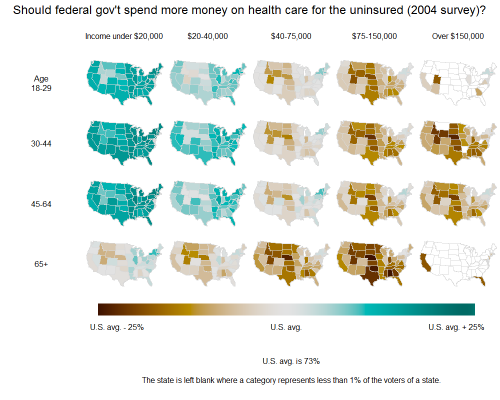From FiveThirtyEight, showing the percentage answering “more” to the question “Providing health insurance for people who do not already have it–should the federal government spend more on it, the same as now, less, or no money at all?” in a 2004 poll. Note that the colors show deviation from the U.S. average, which was 73% answering “more”; brown indicates lower support, turquoise is higher support:

Not surprisingly, higher income correlates with lower support for more spending to cover the uninsured. The lower support among those over age 65, compared to other age groups, is sort of fascinating given that they themselves benefit from government spending on health programs that provide them coverage. But then, given that I’ve seen photos of people holding signs saying “keep the government out of Medicare,” I don’t know why I think people on Medicare would support public health insurance in general.
Of course, these numbers have likely changed now that the health care issue is getting so much coverage and publicity.

Comments 3
ellen — October 25, 2009
thank you for explaining this chart. I saw this posted on FiveThirtyEight and another site and couldn't find any explanation as to what the colors meant.
Jeremiah — October 26, 2009
Do I read this correctly that across the board, higher incomes correlate with less public support?
In that case, why the hoarding behavior in the higher income brackets? There's some interesting psychology there....
Craig — October 27, 2009
The uncharitable, "I got mine" attitude of Seniors towards social programs for other groups is well-documented, persistent, and immensely disappointing. It's another manifestation of the "pull the ladder up behind you" mentality: the fear of beneficiaries that extending their benefits to one more person will jeopardize their own gains. Pull one more person from the water, and the whole lifeboat will founder.
One can try to be sympathetic--their earning years are behind them, the upper bounds of their lifestyles are largely locked in. They have a fairly good health care program and can't really see it getting much more generous. The only possibilities for them are for things to stay much as they are, or else decline. So expanding coverage for other people has no upside for them.
Something similar underlies much "libertarian" thought in this country--the typical libertarian, in my experience, is a bright young person who thinks his generation is the last one that should benefit from state subsidies for education, housing, transportation and so forth. He's already gotten most of the benefit--why should he pay for the next lot?